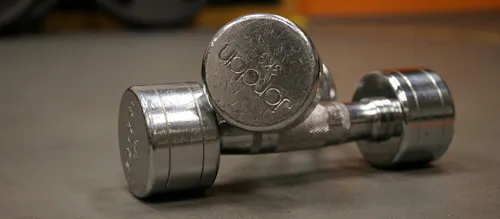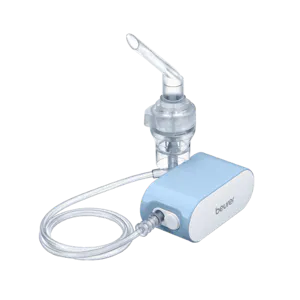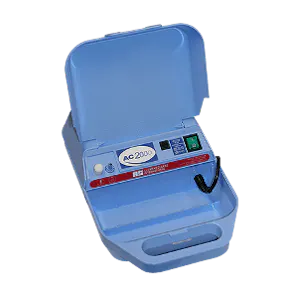Can you improve your lung function?
For people with lung disease, lung function and lung capacity can diminish over time and having enough oxygenated blood can be challenging. You can't improve your lung function so let's have a look at how you can improve your lung capacity.

What is lung function?
Lung function is a measure of how much air your lungs can hold, how quickly you can take in and let out air from your lungs and how well your lungs oxygenate and remove carbon dioxide from your blood.
Lung capacity differs from lung function because lung capacity is the maximum amount of oxygen your body can use.
While lung function cannot be improved, lung capacity can be controlled and improved which is important because if you have COPD you use more energy to breathe than someone who doesn’t.
One way to increase your lung capacity is to improve your exercise tolerance
If you avoid activities that make you breathless, your muscles become weaker. Weaker muscles need more oxygen to work and over time you feel more and more breathless. Exercise causes your heart and breathing rates to increase, so your body has enough oxygen and strengthens your heart and lungs. By becoming more active you can make your muscles stronger, including your breathing muscles. This in time will help you feel less out of breath when you do everyday tasks. Getting breathless when you exercise can actually be good for you.
However if you tell a respiratory patient who has never been terribly active they have to become active, you’ll probably send a cold shiver up their spine. The answer is to start slowly. The first person you should speak to is your respiratory professional. Why not ask them about pulmonary rehabilitation? Pulmonary Rehabilitation is a combination of supervised exercise and education run by trained health professionals. You can learn just why exercise is so important for people with lung conditions as well as how to use breathing techniques during physical activity or when you feel anxious. Learn how to manage any anxiety and low mood, how to use your inhalers and other medicines, how to eat healthier and exactly what to do if you become unwell. The professionals are there by your side as you improve your muscle strength so you can use the oxygen you breathe more efficiently. They can help you cope better with the feeling of being out of breath and improve your fitness so you feel more confident to do things as well as help you feel better mentally.
What if you don’t want to wait?
There are lots of activities you can start right away as long as you remember to start slowly and work at your own pace. Activities such as gardening, walking even housework can all help you to get active. The British Lung Foundation has an exercise DVD you can order online. The Stay Active; Stay Well DVD aims to help you maintain or improve your fitness levels so that you can rediscover activities you thought you could no longer do.
You could explore what is available in your community. Walking has been described as the perfect exercise and Walking for Health offer trained walk leaders who could help you feel more confident about taking those first steps to a more active lifestyle. Walking is also a great way to meet people and having a friend by your side can help keep you motivated.
There are over 230 Breathe Easy support groups where you can chat with people like you who are also living with a lung condition. Hear how they manage their activities of daily living and how they turn a negative into a positive. Or why not try singing? Everyday new research highlights how singing is especially good for people living with a lung condition. You can read Carol’s story and see just how beneficial it has proved, reducing her feelings of being short of breath and helping her feel more in control.
How do you know which exercise is best?
Stretching is the slow lengthening of the muscles. Stretching the arms and legs before and after exercising helps prepare the muscles for activity and helps prevent injury and muscle strain. Regular stretching also increases your range of motion and flexibility. Cardiovascular or aerobic exercise involves a steady physical activity using large muscle groups. This type of exercise strengthens the heart and lungs, and improves the body's ability to use oxygen. Over time this type of exercise can help decrease your heart rate and blood pressure, and improve your breathing. Strengthening, which involves repeated muscle contractions (tightening) until the muscle becomes tired. Strengthening exercises for the upper body are especially helpful for people with COPD, as they help increase the strength of your respiratory muscles. Start slowly and take plenty of breaks especially if you have not been exercising regularly and remember to have fun, by choosing an activity you enjoy you will be more likely to stick with an exercise program. Exercising shouldn’t be a chore.
There's no time like the present
If you or someone you love suffers from a debilitating chronic lung disease such as COPD you may think that a life that includes daily exercise is out of reach. There is lots of advice and guidance available to get you started. Your GP will know what is available locally. Your lungs are a muscle and you need to exercise them like any other muscle, doing so can decrease the feeling of being short of breath. When working out, be sure to pace yourself and know your body, you don’t want to overexert yourself. Be sure to take breaks often and pause if you are feeling any discomfort. It is possible to exercise even with oxygen or a nebuliser so if you are feeling particularly out breath, don’t be afraid to stop and rest. Even if you must take several breaks during an exercise, it’s okay! Take your time and start off slow. In no time at all you’ll be feeling a lot better and more capable of taking your workouts to the next level. Exercise can change the way you feel, breathe, and function, ultimately giving you a higher quality of life. If you need a portable model to get you out and about then take a look at: Philips Nebulisers, Omron Nebulisers, Pari Nebulisers and Beurer Nebulisers.







